| Listing 1 - 10 of 32 | << page >> |
Sort by
|
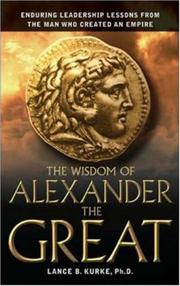
ISBN: 0814408206 0814428371 9780814428375 9780814408209 Year: 2004 Publisher: New York : American Management Association,
Abstract | Keywords | Export | Availability | Bookmark
 Loading...
Loading...Choose an application
- Reference Manager
- EndNote
- RefWorks (Direct export to RefWorks)
Ninety percent of the known world bowed to him. That's power. They also learned to trust and respect him. That's leadership.
Alexander. --- Leadership --- Greece --- Regions & Countries - Europe --- History & Archaeology --- Leadership. --- Alexander, --- Alejandro, --- Alekjhāṇḍara, --- Aleksandar, --- Aleksander, --- Aleksandr, --- Alekʻsandre, --- Aleksandros bar Filipos, --- Aleksandŭr, Makedonski, --- Alessandro, --- Alexander --- Alexandre, --- Alexandros --- Alexandros, --- Alexandros, Megalos, --- Alexandru, --- Alexantros, --- Iskandar, --- Maḳdonya, Aleksandros bar Filipos, --- Makedonski, Aleksandŭr, --- Megalexandros, --- Megas Alexandros, --- Nagy Sándor, --- Sikandar, --- Iskender, --- Μέγας Ἀλέξανδρος, --- Ἀλέξανδρος, --- Ἀλέξανδρος --- אלכסנדר בן פיליפוס, --- אלכסנדר, --- اسكندر كبير --- اسکندر اعظم --- سکندراعظم --- Ability --- Command of troops --- Followership --- Aleksandŭr, --- Александър, --- Македонски, Александър,
Book
ISBN: 9780674493094 9780674744608 0674744608 0674493095 0674745205 Year: 2015 Publisher: Cambridge, MA : Harvard University Press,
Abstract | Keywords | Export | Availability | Bookmark
 Loading...
Loading...Choose an application
- Reference Manager
- EndNote
- RefWorks (Direct export to RefWorks)
The last of Cyrus the Great’s dynastic inheritors and the legendary enemy of Alexander the Great, Darius III ruled over a Persian Empire that stretched from the Mediterranean to the Indus River. Yet, despite being the most powerful king of his time, Darius remains an obscure figure. As Pierre Briant explains in the first book ever devoted to the historical memory of Darius III, the little that is known of him comes primarily from Greek and Roman sources, which often present him in an unflattering light, as a decadent Oriental who lacked the masculine virtues of his Western adversaries. Influenced by the Alexander Romance as they are, even the medieval Persian sources are not free of harsh prejudices against the king Dara, whom they deemed deficient in the traditional kingly virtues. Ancient Classical accounts construct a man who is in every respect Alexander’s opposite—feeble-minded, militarily inept, addicted to pleasure, and vain. When Darius’s wife and children are captured by Alexander’s forces at the Battle of Issos, Darius is ready to ransom his entire kingdom to save them—a devoted husband and father, perhaps, but a weak king. While Darius seems doomed to be a footnote in the chronicle of Alexander’s conquests, in one respect it is Darius who has the last laugh. For after Darius’s defeat in 331 BCE, Alexander is described by historians as becoming ever more like his vanquished opponent: a Darius-like sybarite prone to unmanly excess.
HISTORY / Ancient / Greece. --- Darius --- Alexander, --- Alejandro, --- Alekjhāṇḍara, --- Aleksandar, --- Aleksander, --- Aleksandr, --- Alekʻsandre, --- Aleksandros bar Filipos, --- Aleksandŭr, Makedonski, --- Alessandro, --- Alexander --- Alexandre, --- Alexandros --- Alexandros, --- Alexandros, Megalos, --- Alexandru, --- Alexantros, --- Aleksandŭr, --- Александър, --- Iskandar, --- Maḳdonya, Aleksandros bar Filipos, --- Makedonski, Aleksandŭr, --- Македонски, Александър, --- Megalexandros, --- Megas Alexandros, --- Nagy Sándor, --- Sikandar, --- Iskender, --- Μέγας Ἀλέξανδρος, --- Ἀλέξανδρος, --- Ἀλέξανδρος --- אלכסנדר בן פיליפוס, --- אלכסנדר, --- اسكندر كبير --- اسکندر اعظم --- سکندراعظم --- Codommanus, --- Dārā, --- Darayavaush, --- Dareius --- Iran --- Kings and rulers --- History
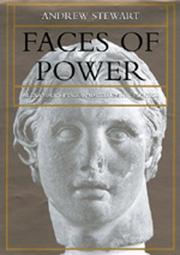
ISBN: 0520909844 058513992X 9780520909847 9780585139920 0520068513 9780520068513 Year: 1993 Volume: 11 Publisher: Berkeley : University of California Press,
Abstract | Keywords | Export | Availability | Bookmark
 Loading...
Loading...Choose an application
- Reference Manager
- EndNote
- RefWorks (Direct export to RefWorks)
Alexander the Great changed the face of the ancient world. During his life and after his death, his image in works of art exerted an unprecedented influence-on marbles, bronzes, ivories, frescoes, mosaics, coins, medals, even painted pottery and reliefware. Alexander's physiognomy became the most famous in history. But can we really know what meaning lies behind these images?Andrew Stewart demonstrates that these portraits-wildly divergent in character, quality, type, provenance, date, and purpose-actually transmit not so much a likeness of Alexander as a set of carefully crafted clichés that mobilize the notion "Alexander" for diverse ends and diverse audiences. Stewart discusses the portraits as studies in power and his original interpretation of them gives unprecedented fullness and shape to the idea and image called "Alexander."
Portraits, Hellenistic. --- Portraits, Hellenistic --- Greece --- Regions & Countries - Europe --- History & Archaeology --- Hellenistic portraits --- Alexander, --- Alejandro, --- Alekjhāṇḍara, --- Aleksandar, --- Aleksander, --- Aleksandr, --- Alekʻsandre, --- Aleksandros bar Filipos, --- Aleksandŭr, Makedonski, --- Alessandro, --- Alexander --- Alexandre, --- Alexandros --- Alexandros, --- Alexandros, Megalos, --- Alexandru, --- Alexantros, --- Aleksandŭr, --- Александър, --- Iskandar, --- Maḳdonya, Aleksandros bar Filipos, --- Makedonski, Aleksandŭr, --- Македонски, Александър, --- Megalexandros, --- Megas Alexandros, --- Nagy Sándor, --- Sikandar, --- Iskender, --- Μέγας Ἀλέξανδρος, --- Ἀλέξανδρος, --- Ἀλέξανδρος --- אלכסנדר בן פיליפוס, --- אלכסנדר, --- اسكندر كبير --- اسکندر اعظم --- سکندراعظم --- Art. --- Politics and government
Book
ISBN: 0191827991 1281930792 9786611930790 019156785X 9780191567858 0199557624 9780199557622 0199557632 9780199557639 Year: 2009 Publisher: Oxford ; New York : Oxford University Press,
Abstract | Keywords | Export | Availability | Bookmark
 Loading...
Loading...Choose an application
- Reference Manager
- EndNote
- RefWorks (Direct export to RefWorks)
A translation, with detailed commentary, of Book 10 of Curtius Rufus' Histories, a major Roman source on the end of the reign of Alexander the Great. The Introduction establishes a profile of Curtius, and his agenda as a historian. Both translation and commentary are designed for the reader without Latin. - ;This book presents a translation, with commentary, of a major Roman source on the end of the reign of Alexander the Great. Book 10 of Curtius' Histories covers the reign of terror and mutiny that followed upon Alexander's return from India; and offers the fullest account of the power strug
Generals --- Alexander, --- Curtius Rufus, Quintus. --- Alejandro, --- Alekjhāṇḍara, --- Aleksandar, --- Aleksander, --- Aleksandr, --- Alekʻsandre, --- Aleksandros bar Filipos, --- Aleksandŭr, Makedonski, --- Alessandro, --- Alexander --- Alexandre, --- Alexandros --- Alexandros, --- Alexandros, Megalos, --- Alexandru, --- Alexantros, --- Aleksandŭr, --- Александър, --- Iskandar, --- Maḳdonya, Aleksandros bar Filipos, --- Makedonski, Aleksandŭr, --- Македонски, Александър, --- Megalexandros, --- Megas Alexandros, --- Nagy Sándor, --- Sikandar, --- Iskender, --- Μέγας Ἀλέξανδρος, --- Ἀλέξανδρος, --- Ἀλέξανδρος --- אלכסנדר בן פיליפוס, --- אלכסנדר, --- اسكندر كبير --- اسکندر اعظم --- سکندراعظم --- Greece --- Macedonia --- Macedon --- Makedhonia --- Makedonia --- Makedoniya --- Makedonja --- Kings and rulers
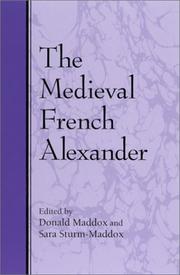
ISBN: 0791488322 0585476179 9780585476179 0791454436 9780791454435 0791454444 9780791454442 Year: 2002 Publisher: Albany, New York : State University of New York Press,
Abstract | Keywords | Export | Availability | Bookmark
 Loading...
Loading...Choose an application
- Reference Manager
- EndNote
- RefWorks (Direct export to RefWorks)
"Alexander the Great was one of the legendary Nine Worthies in the medieval canon of ancient and modern heroes, and medieval writers exploited his legend in a wide variety of literary and didactic texts. Addressing the classical legacy to the Middle Ages as expressed in four centuries of vernacular narratives, this volume offers the first systematic collective study of Alexander the Great's thematic prominence in medieval culture. Contributors from Britain, France, the Netherlands, and the United States combine sensitive textual analyses with perspectives from such diverse fields as art history, codicology, anthropology, sociology, the history of mentalities, and postcolonial theory. Overall, the collection offers a provocative rethinking of the monumental medieval French tradition of Alexander the Great, as well as valuable insight into the emergence and transformations of French literature between the early twelfth century and the end of the Middle Ages."--Jacket.
French literature --- History and criticism. --- Alexander, --- Alejandro, --- Alekjhāṇḍara, --- Aleksandar, --- Aleksander, --- Aleksandr, --- Alekʻsandre, --- Aleksandros bar Filipos, --- Aleksandŭr, Makedonski, --- Alessandro, --- Alexander --- Alexandre, --- Alexandros --- Alexandros, --- Alexandros, Megalos, --- Alexandru, --- Alexantros, --- Aleksandŭr, --- Александър, --- Iskandar, --- Maḳdonya, Aleksandros bar Filipos, --- Makedonski, Aleksandŭr, --- Македонски, Александър, --- Megalexandros, --- Megas Alexandros, --- Nagy Sándor, --- Sikandar, --- Iskender, --- Μέγας Ἀλέξανδρος, --- Ἀλέξανδρος, --- Ἀλέξανδρος --- אלכסנדר בן פיליפוס, --- אלכסנדר, --- اسكندر كبير --- اسکندر اعظم --- سکندراعظم --- Romances --- Old French literature --- Roman d'Alexandre
Book
ISBN: 1844683524 9781844683529 9781844158393 184415839X Year: 2009 Publisher: Barnsley, South Yorkshire [England] : Pen & Sword Military, an imprint of Pen & Sword Books,
Abstract | Keywords | Export | Availability | Bookmark
 Loading...
Loading...Choose an application
- Reference Manager
- EndNote
- RefWorks (Direct export to RefWorks)
Alexander the Great is one of the most famous men in history, and many believe he was the greatest military genius of all time (Julius Caesar wept at the feet of his statue in envy of his achievements). Most of his thirteen year reign as king of Macedon was spent in hard campaigning which conquered half the known world, during which he was never defeated in open battle and never besieged a city he did not take. Yet, while biographies of Alexander abound, there are relatively few full-length books dedicated to the Macedonian army which made his dazzling conquests possible and which proved itsel
Conquerors --- Armies --- Army --- Military power --- Armed Forces --- Conquistadors --- Victors --- Adventure and adventurers --- Alexander, --- Alejandro, --- Alekjhāṇḍara, --- Aleksandar, --- Aleksander, --- Aleksandr, --- Alekʻsandre, --- Aleksandros bar Filipos, --- Aleksandŭr, Makedonski, --- Alessandro, --- Alexander --- Alexandre, --- Alexandros --- Alexandros, --- Alexandros, Megalos, --- Alexandru, --- Alexantros, --- Aleksandŭr, --- Александър, --- Iskandar, --- Maḳdonya, Aleksandros bar Filipos, --- Makedonski, Aleksandŭr, --- Македонски, Александър, --- Megalexandros, --- Megas Alexandros, --- Nagy Sándor, --- Sikandar, --- Iskender, --- Μέγας Ἀλέξανδρος, --- Ἀλέξανδρος, --- Ἀλέξανδρος --- אלכסנדר בן פיליפוס, --- אלכסנדר, --- اسكندر كبير --- اسکندر اعظم --- سکندراعظم
Book
ISBN: 3110956209 9783110956207 3598712790 9783598712791 3111868419 Year: 2012 Publisher: Leipzig : B. G. Teubner,
Abstract | Keywords | Export | Availability | Bookmark
 Loading...
Loading...Choose an application
- Reference Manager
- EndNote
- RefWorks (Direct export to RefWorks)
Iulius Valerius (wohl 4.Jh. n.Chr.) übersetzte den Alexanderroman des Pseudo-Kallisthenes ins Lateinische; diese Übersetzung ist besonders wertvoll als Zeugnis des Lateins jener Zeit. Die Edition von Michela Rosellini (Erstauflage 1993) stellt die auf dem internationalen Buchmarkt einzige moderne textkritische Ausgabe dar und wird zum Teil als regulärer Lesetext für Seminare zur Spätantike empfohlen. Für die zweite Auflage hat die Herausgeberin den gesamten Text durchgesehen, korrigiert und durch Addenda erweitert, in denen ein Überblick über neuere Literatur und neue Lesarten gegeben wird.
Romances, Byzantine. --- Byzantine romances --- Romances, Greek --- Byzantine literature --- Alexander, --- Alejandro, --- Alekjhāṇḍara, --- Aleksandar, --- Aleksander, --- Aleksandr, --- Alekʻsandre, --- Aleksandros bar Filipos, --- Aleksandŭr, Makedonski, --- Alessandro, --- Alexander --- Alexandre, --- Alexandros --- Alexandros, --- Alexandros, Megalos, --- Alexandru, --- Alexantros, --- Aleksandŭr, --- Александър, --- Iskandar, --- Maḳdonya, Aleksandros bar Filipos, --- Makedonski, Aleksandŭr, --- Македонски, Александър, --- Megalexandros, --- Megas Alexandros, --- Nagy Sándor, --- Sikandar, --- Iskender, --- Μέγας Ἀλέξανδρος, --- Ἀλέξανδρος, --- Ἀλέξανδρος --- אלכסנדר בן פיליפוס, --- אלכסנדר, --- اسكندر كبير --- اسکندر اعظم --- سکندراعظم
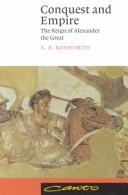
ISBN: 113989000X 1107713137 1107714583 1107712718 1107718171 1107720060 0511518536 9781107720060 9780511518539 0521343208 9780521343206 0521348234 9780521348232 052140679X 9780521406796 Year: 1988 Publisher: Cambridge : Cambridge University Press,
Abstract | Keywords | Export | Availability | Bookmark
 Loading...
Loading...Choose an application
- Reference Manager
- EndNote
- RefWorks (Direct export to RefWorks)
This book is an exploration of the process and consequences of the campaigns of Alexander the Great of Macedon (who reigned from 336 to 323 BC), focusing on the effect of his monarchy upon the world of his day. A detailed running narrative of the actual campaigns from the Danube to the Indus is complemented and enlarged upon by thematic studies on the reaction in Greece to Macedonian suzerainty, the administration of the empire, the evolution of the Macedonian army and its role as the instrument of conquest, and on the origins of the ruler cult.
Generals --- Alexander, --- Alejandro, --- Alekjhāṇḍara, --- Aleksandar, --- Aleksander, --- Aleksandr, --- Alekʻsandre, --- Aleksandros bar Filipos, --- Aleksandŭr, Makedonski, --- Alessandro, --- Alexander --- Alexandre, --- Alexandros --- Alexandros, --- Alexandros, Megalos, --- Alexandru, --- Alexantros, --- Aleksandŭr, --- Александър, --- Iskandar, --- Maḳdonya, Aleksandros bar Filipos, --- Makedonski, Aleksandŭr, --- Македонски, Александър, --- Megalexandros, --- Megas Alexandros, --- Nagy Sándor, --- Sikandar, --- Iskender, --- Μέγας Ἀλέξανδρος, --- Ἀλέξανδρος, --- Ἀλέξανδρος --- אלכסנדר בן פיליפוס, --- אלכסנדר, --- اسكندر كبير --- اسکندر اعظم --- سکندراعظم --- Greece --- Macedonia --- History --- Kings and rulers --- Alexander the Great --- Arts and Humanities
Book
ISBN: 1316088944 1139579185 1139570579 1107253616 1139572334 1139568779 1139049496 1283637561 1139569678 9781139568777 9781139049498 9781139570572 9781139572330 9780521767484 0521767482 9780521148443 0521148448 Year: 2012 Publisher: Cambridge : Cambridge University Press,
Abstract | Keywords | Export | Availability | Bookmark
 Loading...
Loading...Choose an application
- Reference Manager
- EndNote
- RefWorks (Direct export to RefWorks)
Everything we know about Alexander comes from ancient sources, which agree unanimously that he was extraordinary and greater than everyday mortals. From his birth into a hypercompetitive world of royal women through his training under the eyes and fists of stern soldiers and the piercing intellect of Aristotle; through friendships, rivalries, conquests and negotiations; through acts of generosity and acts of murder, this book explains who Alexander was, what motivated him, where he succeeded (in his own eyes) and where he failed, and how he believed that he earned a new 'mixed' nature combining the human and the divine. This book explains what made Alexander 'Great' according to the people and expectations of his time and place and rejects modern judgments asserted on the basis of an implicit moral superiority to antiquity.
Alexander, --- Alejandro, --- Alekjhāṇḍara, --- Aleksandar, --- Aleksander, --- Aleksandr, --- Alekʻsandre, --- Aleksandros bar Filipos, --- Aleksandŭr, Makedonski, --- Alessandro, --- Alexander --- Alexandre, --- Alexandros --- Alexandros, --- Alexandros, Megalos, --- Alexandru, --- Alexantros, --- Aleksandŭr, --- Александър, --- Iskandar, --- Maḳdonya, Aleksandros bar Filipos, --- Makedonski, Aleksandŭr, --- Македонски, Александър, --- Megalexandros, --- Megas Alexandros, --- Nagy Sándor, --- Sikandar, --- Iskender, --- Μέγας Ἀλέξανδρος, --- Ἀλέξανδρος, --- Ἀλέξανδρος --- אלכסנדר בן פיליפוס, --- אלכסנדר, --- اسكندر كبير --- اسکندر اعظم --- سکندراعظم --- Greece --- Macedonia --- History --- Arts and Humanities
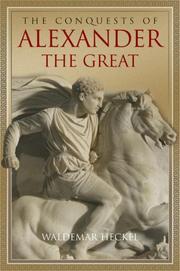
ISBN: 1107175186 128333089X 9786613330895 0511366833 0511611404 1139130935 0511367422 0511365551 0511366183 9780511367427 9780511611407 0521842476 9780521842471 9780521842471 0521842476 9780521603232 0521603234 9781107175181 6613330892 9780511366833 9781139130936 9780511365553 9780511366185 131633466X Year: 2008 Publisher: Cambridge ; New York : Cambridge University Press,
Abstract | Keywords | Export | Availability | Bookmark
 Loading...
Loading...Choose an application
- Reference Manager
- EndNote
- RefWorks (Direct export to RefWorks)
Waldemar Heckel provides a revisionist overview of the conquests of Alexander the Great. Emphasising the aims and impact of his military expeditions, the political consequences of military action, and the use of propaganda, both for motivation and justification, his underlying premise is that the basic goals of conquest and the keys to military superiority have not changed dramatically over the millennia. Indeed, as Heckel makes clear, many aristocratic and conquest societies are remarkably similar to that of Alexander in their basic aims and organisation. Heckel rejects the view of Alexander as a reincarnation of Achilles - as an irrational youth on a heroic quest for fame and immortality. In an engaging and balanced account of key military events, Heckel shows how Alexander imposed his will on the willing and how the defeated were no longer capable of resisting his military might.
Alexander, --- Alejandro, --- Alekjhāṇḍara, --- Aleksandar, --- Aleksander, --- Aleksandr, --- Alekʻsandre, --- Aleksandros bar Filipos, --- Aleksandŭr, Makedonski, --- Alessandro, --- Alexander --- Alexandre, --- Alexandros --- Alexandros, --- Alexandros, Megalos, --- Alexandru, --- Alexantros, --- Aleksandŭr, --- Александър, --- Iskandar, --- Maḳdonya, Aleksandros bar Filipos, --- Makedonski, Aleksandŭr, --- Македонски, Александър, --- Megalexandros, --- Megas Alexandros, --- Nagy Sándor, --- Sikandar, --- Iskender, --- Μέγας Ἀλέξανδρος, --- Ἀλέξανδρος, --- Ἀλέξανδρος --- אלכסנדר בן פיליפוס, --- אלכסנדר, --- اسكندر كبير --- اسکندر اعظم --- سکندراعظم --- Greece --- Macedonia --- History --- Arts and Humanities
| Listing 1 - 10 of 32 | << page >> |
Sort by
|

 Search
Search Feedback
Feedback About UniCat
About UniCat  Help
Help News
News